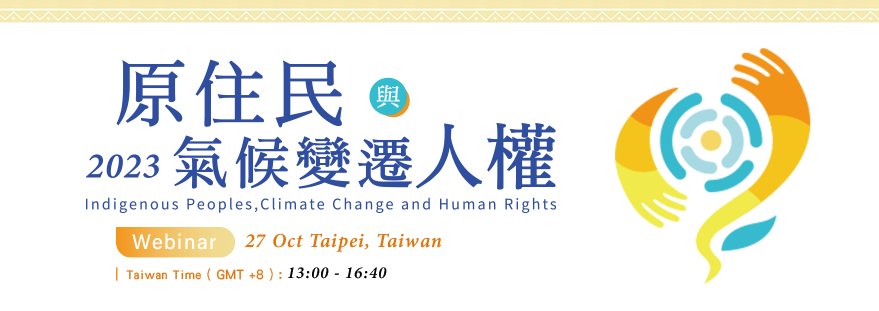and Human Rights
儘管2023年3月聯合國政府間氣候變遷委員會(IPCC)第六次評估報告決策者摘要曾指出,2030年全球平均增溫將超過攝氏1.5度,但人類的破壞速度遠超過科學界的預測。依據5月世界氣象組織(WMO)報告,受到聖嬰現象影響,不用等到2030年,5年內就有高機率(66%)常態性增溫超過1.5度,暖化速度一次次比預估更快。
在增溫趨勢加速的情境下,更積極的調適,將是不得不的選擇。解方在於具有氣候韌性的發展觀,需要不同(文化)價值觀、世界觀和知識,包含科學知識、原住民知識和地方知識。
過去我們很少關注原住民的氣候角色,但隨著2023年2月《氣候變遷因應法》施行,廣泛納入與原住民族、自然碳匯有關條文,包含:協助原住民族穩定轉型(第3條);兼顧原住民族權益、與原住民族共同推動及管理原住民族地區內之自然碳匯、相關權益共享(第5條);融入綜合性與以社區及原住民族為本之氣候變遷調適政策等(第17條)等制定,原住民於氣候人權議題的關鍵位置漸漸受到重視。
為此,在環境部氣候變遷署委託下,本會期望透過線上活動,邀請幾位國內外重要領域專家、學者共同討論,藉此引導、開啟對話交流;也邀請各方朋友,踴躍提出相關意見,豐富原住民、自然解方與氣候人權的內涵。
and Human Rights
Although the March 2023 Summary for Policymakers of the Sixth Assessment Report of the United Nations Intergovernmental Panel on Climate Change (IPCC) indicates that the global average temperature increase will exceed 1.5 degrees Celsius by 2030, the rate at which actual human induced environmental damage is occurring is exceeding the predictions of the scientific community.
According to the May 2023 World Meteorological Organization (WMO) report, due to the impacts of El Niño, there is a high probability (66%) that the increase in average global temperatures will exceed 1.5 degrees Celsius within the next 5 years, before 2030. The temperature increase benchmarks are reached faster than expected time and time again.
Greater effort in establishing active adaptation in the midst of these accelerating warming trends is crucial. The solution lies in a climate-resilient vision of development that utilizes different cultural values, worldviews, and knowledge, including scientific, regional, and indigenous knowledge.
In the past, Taiwan as a whole paid little attention to the experiences of indigenous peoples in climate change, but with the implementation of the Climate Change Response Act in February 2023, provisions related to indigenous peoples and natural carbon sinks have been included, such as: assisting indigenous peoples in their sustainable development (Article 3), takes into account the rights and interests of indigenous peoples in promoting managing natural carbon sinks in Indigenous peoples’ regions (thereby sharing related benefits)(Article 5), and formulates and integrates comprehensive community and indigenous peoples-based climate adaptation policies (Article 17). These provisions have successfully generated greater attention towards the key positions of indigenous peoples in climate human rights issues.
To this end, under the commission of the Climate Change Administration of the Ministry of Environment, EQPF hopes to invite several domestic and foreign experts and scholars in important fields to to discuss their area of focus and guide relevant dialogue and exchanges through online activities. EQPF also invites friends from all parties to actively propose relevant opinions that enriches the connotations of indigenous peoples, Nature-based Solutions and climate human rights.
